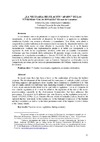Identificador persistente para citar o vincular este elemento:
https://accedacris.ulpgc.es/jspui/handle/10553/55838
| Campo DC | Valor | idioma |
|---|---|---|
| dc.contributor.author | González Cabrera, Inmaculada | en_US |
| dc.date.accessioned | 2019-06-20T14:31:27Z | - |
| dc.date.available | 2019-06-20T14:31:27Z | - |
| dc.date.issued | 2018 | en_US |
| dc.identifier.issn | 2530-7142 | en_US |
| dc.identifier.uri | https://accedacris.ulpgc.es/handle/10553/55838 | - |
| dc.description.abstract | En los últimos años se ha producido un auge en la explotación de viviendas con fines vacacionales. A él ha contribuido el desarrollo de Internet y la aparición de múltiples plataformas digitales que acercan a oferentes y demandantes. Esta oferta, hasta ahora al margen de los canales tradicionales de comercialización en masa del alojamiento turístico, nos plantea serias dudas acerca de cómo afrontar su regulación. Esto es, si ha de hacerse necesariamente mediante una reglamentación propia o si habrá que incorporarla a la regulación del resto de los alojamientos turísticos, sobre todo en aquellas Comunidades Autónomas que han afrontado dicha ordenación. El presente trabajo aborda esta cuestión centrándose en la regulación contenida en el Decreto 113/2015, de 22 de mayo, de Viviendas Vacacionales, ordenación ésta que analizaremos de forma crítica sobre la base del reproche que se le ha hecho por los propietarios y por la Comisión Nacional de los Mercados y de la Competencia, así como, por los recientes pronunciamientos del Tribunal Superior de Justicia de Canarias. | en_US |
| dc.description.abstract | In recent years there has been a boom in the exploitation of housing for holiday purposes. The development of the Internet and the emergence of multiple digital platforms that bring suppliers and applicants closer together have considerably contributed to it. This type of supply, outside the traditional mass marketing channels of tourist accommodation up to now, raises serious doubts about how to deal with its regulation. This is, if it requires its own specific regulation or if it must be added to the regulation of the rest of the tourist accommodation, especially in the Autonomous Communities that have addressed this arrangement. The present work addresses this issue focusing on the regulation contained in Decree 113/2015, of May 22, on Vacation Homes, which we critically analyze, based on the reproach that has been made by the owners and by the National Commission of the Markets and the Competition, as well as by the latest pronouncements of the Superior Court of Justice of the Canary Islands. | en_US |
| dc.language | spa | en_US |
| dc.relation.ispartof | Revista internacional de derecho del turismo | en_US |
| dc.source | Revista internacional de derecho del turismo [ISSN 2530-7142], v. 2 (1), p. 23-54 | en_US |
| dc.subject | 531290 Economía sectorial: turismo | en_US |
| dc.subject | 560503 Derecho mercantil | en_US |
| dc.subject.other | Viviendas vacacionales | en_US |
| dc.subject.other | Regulación | en_US |
| dc.subject.other | Economía colaborativa | en_US |
| dc.subject.other | Sharing economy | en_US |
| dc.subject.other | Vacation homes | en_US |
| dc.title | ¿La necesaria regulación “Ad Hoc” de las viviendas vacacionales? el caso de Canarias | en_US |
| dc.type | info:eu-repo/semantics/article | en_US |
| dc.type | Article | en_US |
| dc.investigacion | Ciencias Sociales y Jurídicas | en_US |
| dc.type2 | Artículo | en_US |
| dc.identifier.ulpgc | Sí | es |
| dc.description.dialnetimpact | 0,0 | |
| dc.description.dialnetq | Q1 | |
| dc.description.dialnetd | D1 | |
| item.grantfulltext | open | - |
| item.fulltext | Con texto completo | - |
| crisitem.author.dept | GIR ECOAQUA: Turismo, ordenación del territorio y medio ambiente | - |
| crisitem.author.dept | IU de Investigación en Acuicultura Sostenible y Ecosistemas Marinos (IU-Ecoaqua) | - |
| crisitem.author.dept | Departamento de Ciencias Jurídicas Básicas | - |
| crisitem.author.orcid | 0000-0003-3049-8690 | - |
| crisitem.author.parentorg | IU de Investigación en Acuicultura Sostenible y Ecosistemas Marinos (IU-Ecoaqua) | - |
| crisitem.author.fullName | González Cabrera, Inmaculada Concepció | - |
| Colección: | Artículos | |
Visitas
215
actualizado el 15-ene-2026
Descargas
504
actualizado el 15-ene-2026
Google ScholarTM
Verifica
Comparte
Exporta metadatos
Los elementos en ULPGC accedaCRIS están protegidos por derechos de autor con todos los derechos reservados, a menos que se indique lo contrario.
